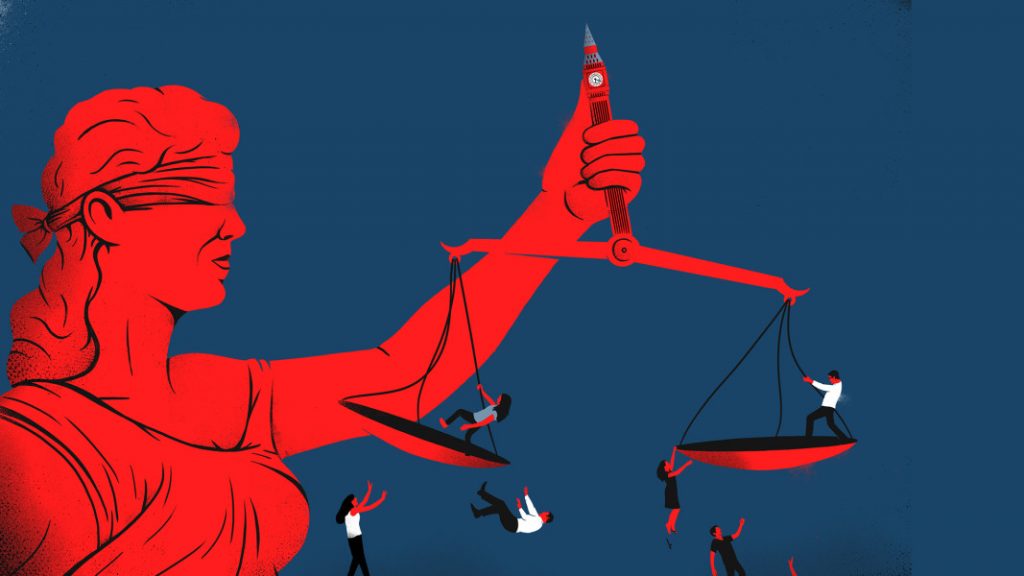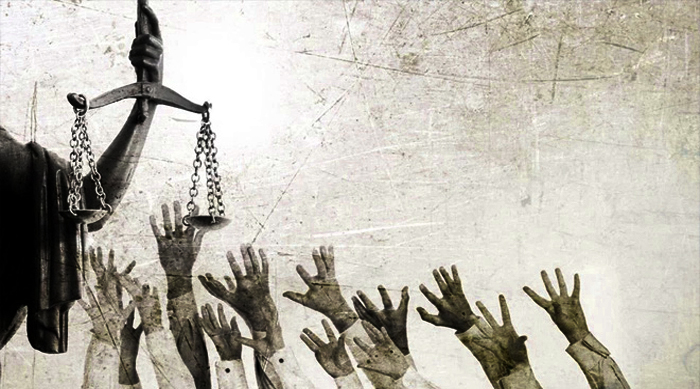
Justice is something that should be available to everyone without any discrimination. The people who can march an army of lawyers do not have any monopoly on justice. If there is no uniformity in the justice delivery mechanism then such would not be considered as justice. Keeping this in mind, the Indian Parliament came up with the 42nd Amendment to the Indian Constitution which provided for the right to free legal aid.
But providing a right and actual enforcement of such rights, in reality, are two different things. This article tries to address the question as to whether such provision of free legal aid did in fact fructify or remains mere words on papers. This article first throws light on the concept of free legal aid; that is which provisions make legal aid a right and why this is important. Moving further the article talks about the issues and challenges which make legal aid a fallacy. And finally, the article goes on to provide a few solutions to such issues which can help in turning such fallacy into a reality.
The Importance
To understand why legal aid is important, we need to first understand what legal aid is. Legal aid is the act of providing assistance to a person in order for him or her to be able to avail justice through the courts of law. Does the question now come to how does one get justice? The answer to this would be, by providing not merely rights to citizens but also remedies for instances when their rights are violated. This is in consonance with the Roman law principle of ubi jus ibi remedium i.e. where there is a right, there is a remedy. Now to avail justice or to avail these remedies the citizens need to approach courts of law and that is not a cheap business.
Hiring a lawyer, traveling to court, appearing in court whenever the court summons is a costly process. And in a country like ours, not all citizens have the privilege to incur such expenses. Hence arises the need for legal aid. Legal Aid is an issue that is discussed in every country whether it is developed or not because in every society there are people who can’t afford to avail legal services which are provided to them by any form of government to protect their rights.
According to Justice P.N. Bhagwati, legal aid is a method that makes justice easily accessible and in reach of those who have to resort to it for enforcement of rights given to them by law. He correctly points out that the poor and the illiterate should be able to approach the courts and their ignorance and poverty should not be an obstacle in the way of obtaining justice from the Courts.
At this point, it is pertinent to look towards the rehabilitation of those members of society who are culturally and economically deprived. In order to meet that end, it is necessary to provide them with a means for redressing their grievances and enforcing their rights. People become contributing members of society only if the law can be made to work for people. If the law, on the other hand, is an enemy and if a poor person cannot find means to redress his grievances through the instruments of the law, he might turn against the legally constituted authorities and his destructive impulses will be encouraged.
A poor person unjustly convicted because of lack of adequate counsel is not only wrongfully punished, but he is likely to be alienated from society. A poor person who is unable to contest an unjust eviction will not have much confidence in the rights that democracy grants him. A poor person who is defrauded and finds no one to turn to because he cannot pay a lawyer is not likely to understand the rule of law.
Provisions providing for Free Legal Aid
Indian Constitution provides for rule of law and equality before the law. The Preamble of the Indian Constitution aims to secure to the people of India, equal justice – socio, economic and political. In accordance with this, Article 38(1) of the Indian Constitution states that the State shall promote the welfare of the people by securing the social order including justice. Keeping all this in consideration, the Indian Parliament introduced Article 39(A) which gives people the constitutional right to free legal aid. Legal assistance to the poor is also guaranteed under Articles 21 and 14.
If an accused is not able to afford legal services, then it is the duty of the State to bear the costs. The Courts are also obligated to provide legal aid to the accused on the State expenses. In pursuance of all this, in 1987, the Legal Services Authorities Act was enacted by the Parliament. It came into force on 9th November 1995 and aimed to establish a nationwide uniform network for providing free and competent legal services to the weaker sections of the society.
The Ground Reality – Provisions of free legal aid are mere words on paper

Providing rights and passing laws to that effect is only the first step to achieve the goal of providing justice to all. The second and crucial step is to enforce such laws and ensure that on the ground level people are able to avail of such free legal aid. But in India, the movement of legal aid has been proved ineffective. The reasons behind such failure are many.
One of the reasons is the unawareness about such provision of legal aid. The literacy rate in India is nearly as high as 70%, which points towards the reality of illiteracy in our country. Many times the accused doesn’t even know that s/he has a right to legal aid. Other major reasons include the perception that such free service is not of good quality. The legal service authorities do not have enough lawyers and even if some lawyers are appointed they are not willing to provide competent assistance due to financial constraints.
The remuneration paid to lawyers for such services is so low that at times the lawyers are not even able to meet their expenses. This leads to lawyers having less dedication as compared to dedication towards cases for which they are paid. Moreover, many lawyers do not work pro bono cases as they are not given social education in colleges. Further, some lawyers hold their clients’ cases for ransom by using delay tactics. Also, some of them demand extra money from their clients even though their costs are covered by the State.
Looking at such reasons leads us to believe that even though there are many provisions that provide citizens their rights to free legal aid, still in reality people are not able to avail of such aid. Time and again the judiciary has held and recognized these same rights, but it has failed, in essence, to enforce them effectively.
The Road Ahead
The path ahead is one of the obstacles; however, if we start working with full determination then the purpose for which free legal aid was introduced can very well be achieved. The first step towards this would be to educate the citizens and make them aware of their rights and the remedies. This can be done by connecting the legal clinics of law colleges to their nearby courts so that the people who need help can first approach these non-judicial officers to understand their rights given by the Constitution of India.
Another way can be by holding campaigns in villages and giving speeches in vernacular languages so that even illiterate people can understand their rights. To spread awareness, the help of NGOs can be taken. The second step to be taken is to promote the culture of pro bono and social education has to be provided to law students at an early stage in order for them to imbibe social values from the beginning itself. This would ensure that in the future, lawyers won’t hesitate in working on pro-bono cases.
These two steps would work as foundational steps. This would ensure that the groundwork is done and now only the minimal tasks would remain. For such remaining tasks, the Courts are to be made more active and obligated towards ensuring that none of the accused gets his/her right to avail free legal aid violated. Further, there has to be a focus on the development of demonstration legal aid/public defender offices in cooperation with governments. Lastly, the government must employ more efficient processes to improve legal aid delivery including, but not limited to, increased compensation for legal aid lawyers.
Conclusion
Legal aid is not a charity; it is an obligation of the State and a right of the citizens. The objective of legal aid is the equal distribution of justice, effective implementation of welfare benefits, and elimination of social and structural discrimination against the poor. Legal Services Authorities Act, 1987, which acts as the guideline of the rendering of free justice has the same objective. So, with these things in mind, the prime object of the State should be equal justice for all. Thus, legal aid strives to ensure that the constitutional pledge is fulfilled in its letter and spirit and equal justice is made available to the downtrodden and weaker sections of society.
As we see that the goals which are set are not met, it is time to work determinately on achieving the said goals. The framework has been made, only the groundwork is remaining. Once steps are taken to ensure effective implementation of the legal aid, this right which is a fallacy at present can very well turn into a reality.
Editor’s Note
The right to free legal aid is a constitutional right given to the citizens of India. Unfortunately, this right is not fully exercised and the provisions of free legal aid are not enforced effectively due to many reasons. This article explains the concept of free legal aid, its importance as well as the provisions providing for free legal aid in the Indian Constitution. The ground reality of such provisions being merely words on paper has been highlighted and the reasons for the same have also been explained.
The author has further given various suggestions that could help convert the fallacy of the right to free legal aid into a reality. The author has concluded by saying that steps should be taken determinately in order to ensure effective implementation of this constitutional right to free legal aid so that equal justice for all the citizens of India can be guaranteed, as enshrined in the Preamble to our Constitution.